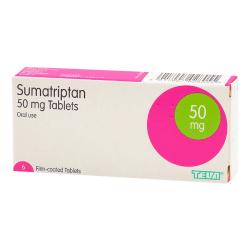- Private & confidential service
- Genuine medication
- All-inclusive service - No hidden fees
- Next day delivery
- Migraine
Migraine: start your consultation
- 1. Answer the online medical questions
- This helps our doctors to decide which treatment is safe for you.
- 2. Select your treatment
- You will see a list of recommended treatments. You can select the one you prefer.
- 3. Checkout and delivery
- Once you’ve completed the checkout, our doctors will review your answers. If all is safe, you will receive your treatment tomorrow.

- Fast-acting migraine relief
- Relieves nausea and headaches
- Available as both tablets and a nasal spray

- Quick relief from migraine symptoms
- Effective within 2 hours of taking it
- Dissolves under the tongue

- Fast-acting migraine treatment
- Best for long-lasting migraines
- Available as tablets

- Treatment for migraines
- Taken during an episode
- Relieves a number of symptoms

- Effective migraine relief
- Available in tablets and spray
- Works instantly

- Fast-acting migraine treatment
- Works in 30 minutes
- Available as tablets or melts

- Fast-acting migraine medicine
- Works in 30 minutes
- Melts that dissolve on the tongue
Migraine
Migraine is a long-term and severe health condition. Whilst symptoms vary from person-to-person, migraine is generally characterised by intense headaches, nausea and visual disturbances.
It can affect your life in all sorts of ways. In fact, it is estimated that people in the UK lose 25 million days of work and education due to migraines and the condition was found to be the sixth highest global cause of years lost to disability (YLD) in 2013.
Whilst there is no cure for migraines, there are prescription treatments available to help alleviate symptoms and get quick relief from an attack. Here at HealthExpress, we offer both tablets and nasal sprays to help you combat painful symptoms.
Topics
What is a migraine?
Migraine is a headache disorder that causes severe headaches, nausea, visual disturbances and sensory sensitivity. The condition impacts many, and symptoms are often severe enough that people can’t do anything else.
There are two main types of migraine. The first is known as migraine with aura (previously called a ‘classic migraine’), where people will often experience a series of sensory disturbances known as ‘aura’ before a migraine attack. People who have this type may experience blind spots, flashes of light, numbness, tingling and other disturbances. Aura symptoms usually occur within an hour of the attack.
The other is migraine without aura, which is the most common type and used to be called ‘common migraine’ or ‘hemicrania simplex’. Unlike the latter, people who have this type will not experience any aura symptoms before a migraine attack.
Some other types of migraine include:
- chronic migraine - symptoms occur at least 15 days per month
- migraine with brainstem aura - a rare type where migraines occur with other neurological symptoms including slurring of speech and pins and needles
- vestibular migraine - migraines occur with balance problems
- hemiplegic migraine - a rare type that involves temporary weakness on one side of the body
What causes a migraine?
The exact cause of migraines is unknown, though, it is believed to be caused by abnormal brain activity affecting neural signals, chemicals and blood vessels in the brain.
Experts aren’t sure what causes this abnormal brain activity, but they believe genetics play a significant role in the onset of migraine. It may be that you have a group of genes that mean you are more sensitive to environmental and lifestyle changes that bring on migraine attacks.
Migraine is a condition more typical in women than men, and migraines are closely linked to menstrual cycles. This is believed to be due to a fall in oestrogen levels before your period starts, as well as a higher level of prostaglandins present in those who have heavy periods.
What triggers migraine attacks?
If you are sensitive to migraines, lifestyle and environmental changes may be more likely to cause a migraine. Some of the most common triggers include:
- stress
- skipping meals
- low blood sugar
- alcohol
- hormonal changes (from menopause or menstrual cycle)
- lack of sleep
- lighting and temperature changes
Everyone’s triggers are different, but understanding them may help you to manage your condition.
What are the symptoms of a migraine?
There are five main stages of a migraine, all of which have specific symptoms. You may not experience all of them and stages can overlap for some.
Knowing the different stages can help you learn more about your own migraines as well as help you treat and prepare for potential attacks.
1. Premonitory stage (Prodome)
During this stage, some will experience some physical and mental changes up to 24 hours before a migraine occurs, acting as a warning sign for an attack.
Changes may include:
- feeling tired
- craving certain foods
- overall mood changes (high or low mood)
- feeling thirsty
- neck stiffness
2. Aura stage
For those who experience migraine with aura, this stage will occur up to 60 minutes before the onset of a migraine attack. Although in some cases, aura can occur without the headache which is known as a ‘silent migraine’.
Aura is caused by a wave of neural activity that spreads across the brain, a phenomenon known as cortical spreading depression.
It can involve a wide range of neurological symptoms, including:
- changes in sight such as dark or coloured spots, ‘sparkles’ and/or zigzag lines
- numbness or ‘pins and needles’
- weakness
- sensation of spinning and poor balance
- speech and hearing changes
For those with rarer migraine disorders, they may experience memory changes, fear, confusion, partial paralysis or fainting.
3. Headache / main attack stage
This is the stage that includes the severe and intense head pain, and what many understand as a migraine.
The headache itself is typically throbbing and can be made worse by movement. The pain usually occurs on one side of the head, especially at the beginning of the attack. However, pain can occur all over the head.
Other symptoms that occur alongside a headache include:
- nausea
- vomiting
- sensitivity to light, sound, smell and movement
4. Resolution
This stage is the end of the attack. Migraine attacks tend to fade away slowly on their or after treatment over 4 hours or after a couple of days. An attack may end suddenly after throwing up, crying or sleeping.
5. Recovery / postdrome stage
The final stage of an attack is known as the ‘postdrome’ stage, which is the recovery process after an attack. Many feel effects for up to days after the initial attack.
You may feel tired and drained in this recovery phase. Others may experience symptoms that mirror the ones in the premonitory stage. For instance, if you feel very tired before a migraine attack occurs, you may feel very energised afterwards.

How can I treat a migraine?
There is no cure for migraines, but there are several effective treatments that help to quickly ease symptoms.
As soon as you feel a migraine attack coming in, it’s recommended that you take your painkillers straight away. It means the medication can be absorbed quickly into your bloodstream and treat your pain more quickly.
Most people will find that over-the-counter painkillers such as paracetamol, aspirin or non-steroidal anti-inflammatory drugs (NSAIDs) such as ibuprofen sufficiently tackle the pain. Soluble versions of these medications are also a good solution for quick absorption. If you find that taking these medications do not help, then you may require prescription-only medications.
The most common medications prescribed for migraines belong to a group called triptans (5-HT1 agonists), which includes Sumatriptan (Imigran), Zolmitriptan (Zomig) and Almotriptan (Almirall). They work by reversing the widening of the blood vessels in your brain and targeting the trigeminal nerve, both of which are linked to migraine onset. Some triptan tablets are available as tablets over-the-counter however most are only available on prescription. You can also get triptans in the form of nasal sprays and injections.
Your doctor may also recommend you take an anti-sickness tablet known as an antiemetic (such as prochlorperazine) to help with any nausea or vomiting.
Acute medication for migraines should be used sparingly as continued use can have the opposite effect, and bring on more headaches. This is a condition known as Medication Overuse Headache (MOH) or rebound headaches. New medicines being developed hope to tackle this phenomenon and treat migraine specifically.
How can I prevent migraines?
Medications
Those who have particularly bad cases of migraine may be prescribed preventative treatment. You will have to take this medication every day to prevent and reduce the severity of migraine attacks.
Medicines used to treat other conditions are often used as migraine preventatives. This includes certain medicines for high blood pressure, epilepsy and depression. Women who have menstrual migraine, may benefit from taking hormonal medication such as the combined contraceptive pill.
However, a medication has been recently developed specifically for the prevention of migraine known as CGRP mAbs (calcitonin gene-related peptide monoclonal antibodies). They target CGRP antibodies, a substance released by the brain which are believed to cause attacks, to prevent a migraine from occurring.
Lifestyle changes
As well as medication, there are things you can do yourself to help with your migraines:
- keep good sleep hygiene - keep a regular sleep schedule, avoid using your bed for anything except sleep, maintain an optimal sleep environment etc.
- exercise - however it can be a trigger for some, due to a sudden lack in oxygen or due to a hit on the head (in contact sport)
- manage your stress
- reduce time in front of screens
- avoiding caffeine and alcohol
- keep hydrated
- not skipping meals and eating full meals
Some also find that acupuncture helps with their chronic migraines. It’s also important to keep a headache diary, especially when you see your doctor or are referred to a specialist. It’ll help you identify what triggers your migraines and help you treat your condition.
How do I buy treatment online?
For the acute treatment of migraine, you may purchase Almotriptan, Zolmitriptan, and Sumatriptan online. You can get both pills and a nasal spray if you have been diagnosed with migraine by your primary doctor. To purchase, all you need to do is fill out a quick medical questionnaire. After you have filled out the form, one of our registered doctors will look at it and decide if you are able to take the medication. If you are approved, we will send your medication with free next-day delivery.
medical form
medication
prescription
from pharmacy

